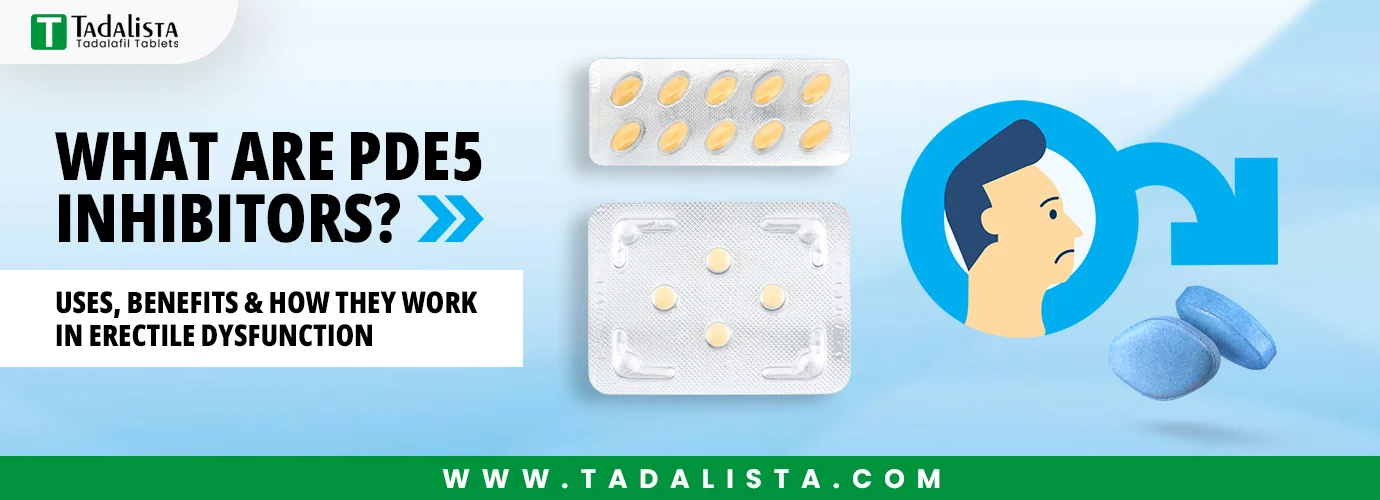Dr James M - Male Sexual and Reproductive Health, Urology | Last Reviewed: January 13, 2026
Introduction
Erectile dysfunction (ED) is a condition that impacts millions of men worldwide, causing difficulty in achieving or maintaining an erection. While there are many treatment options available, PDE5 inhibitors have become the most commonly prescribed solution. But what exactly are PDE5 inhibitors, and how do they work?
In this article, we’ll explore the science behind PDE5 inhibitors, their role in treating erectile dysfunction, other medical uses, benefits, safety considerations, and why they remain a cornerstone of ED therapy.
Understanding PDE5 (Phosphodiesterase Type-5)
To understand PDE5 inhibitors, it’s important to first look at PDE5 itself.
PDE5 stands for phosphodiesterase type-5, an enzyme found in certain parts of the body, especially the smooth muscle cells of blood vessels.
Its main role is to regulate blood flow by breaking down a chemical messenger called cGMP (cyclic guanosine monophosphate).
cGMP is essential for relaxing blood vessel walls and allowing increased blood flow.
In erectile dysfunction, PDE5 activity is often too strong, breaking down cGMP too quickly and preventing enough blood from reaching the penis during arousal.
How PDE5 Inhibitors Work
PDE5 inhibitors are medications designed to block the PDE5 enzyme. By doing so, they:
Prevent the rapid breakdown of cGMP.
Allow cGMP levels to remain higher for longer.
Keep blood vessels relaxed and open.
Increase blood flow to specific areas, such as the penis during sexual stimulation.
The result is improved erectile function, as blood can more easily fill the penile tissues.
⚠️ Important to note: PDE5 inhibitors only work when there is sexual arousal. They do not automatically cause an erection; instead, they enhance the body’s natural response.
Medical Uses of PDE5 Inhibitors
While PDE5 inhibitors are best known for treating erectile dysfunction, they also have other important medical applications.
1. Erectile Dysfunction (ED)
The most common use.
Helps men achieve and maintain erections by improving blood flow.
2. Pulmonary Arterial Hypertension (PAH)
PDE5 inhibitors help relax blood vessels in the lungs.
This reduces pressure in pulmonary arteries and makes it easier for the heart to pump blood.
3. Benign Prostatic Hyperplasia (BPH) (under study)
Some research suggests PDE5 inhibitors may help relieve urinary symptoms associated with prostate enlargement.
4. Other Investigations
Being studied for possible benefits in heart disease and circulation-related conditions.
Benefits of PDE5 Inhibitors
These medications have become a first-line treatment for ED because of their proven effectiveness and convenience.
Improved erectile function: Restores natural ability to achieve firm erections.
Better sexual confidence: Reduces anxiety and performance stress.
Quick onset: Most pills work within 30–60 minutes.
Long duration: Depending on the type, effects can last from 4 to 36 hours.
Non-invasive treatment: Easy to take as an oral pill compared to injections or surgeries.
Types & Duration of PDE5 Inhibitors
Different PDE5 inhibitors are available, and while they all work similarly, their onset and duration of action vary.
Short-acting types: Begin working within 30–60 minutes and last about 4–6 hours.
Longer-acting types: May take slightly longer to start working but last up to 24–36 hours, providing more flexibility.
Doctors prescribe the type and dosage based on individual health, age, and frequency of sexual activity.
Safety, Risks & Side Effects
Like any medication, PDE5 inhibitors may cause side effects. Most are mild and temporary, but some can be serious.
Common side effects:
Headache
Flushing (warmth in the face or chest)
Dizziness
Stuffy nose
Indigestion
Less common but serious risks:
Vision or hearing changes
Chest pain
Erection lasting more than 4 hours (priapism)
Precautions:
Do not use PDE5 inhibitors if you take nitrate-based heart medications, as the combination can dangerously lower blood pressure.
Men with heart disease, severe liver or kidney issues should consult their doctor before use.
Only take one pill per day in the prescribed dosage.
Lifestyle Factors That Support Effectiveness
While PDE5 inhibitors are highly effective, lifestyle choices can also make a big difference in results. Supporting healthy blood flow naturally can enhance the effectiveness of these medications.
Eat a balanced diet: Focus on heart-healthy foods like fruits, vegetables, whole grains, and lean proteins.
Exercise regularly: Improves circulation and cardiovascular health.
Avoid smoking and excessive alcohol: Both restrict blood flow and worsen ED.
Reduce stress: Anxiety and depression can reduce the effectiveness of ED treatments.
The Psychological Impact of PDE5 Inhibitors
Beyond the physical benefits, PDE5 inhibitors also play a major role in improving mental and emotional health. Men who use them often report:
Reduced performance anxiety.
Improved self-esteem and confidence.
Stronger relationships and intimacy.
Better overall quality of life.
This combination of physical and psychological benefits explains why PDE5 inhibitors remain so popular and effective.
Conclusion
PDE5 inhibitors are a class of medications that have revolutionized the treatment of erectile dysfunction. By blocking the PDE5 enzyme, they improve blood flow to the penis, allowing men to achieve and maintain erections naturally during sexual arousal.
Their effectiveness, ease of use, and additional medical applications—such as treating pulmonary arterial hypertension—make them one of the most important breakthroughs in men’s health.
When taken responsibly under medical supervision, PDE5 inhibitors are a safe and powerful option for men looking to overcome ED and restore confidence in their intimate lives.
With a decade of experience in pharmaceutical research and medical writing, I specialize in exploring the science behind erectile dysfunction medications. My work emphasizes treatment innovation, safety evaluations, and patient-centric care strategies.


